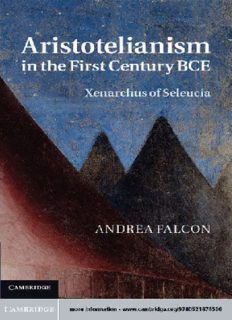Table Of ContentARISTOTELIANISM IN THE
FIRST CENTURY BCE
ThisbookisafullstudyoftheremainingevidenceforXenarchusof
Seleucia, one of the earliest interpreters of Aristotle. Andrea Falcon
places the evidence in its context, the revival of interest in Aristo-
tle’sphilosophythattookplaceinthefirstcenturybce.Xenarchusis
oftenpresentedasarebel,challengingAristotleandtheAristotelian
tradition. Falcon argues that there is more to Xenarchus and his
philosophical activity than an opposition to Aristotle; he was a cre-
ativephilosopher,andhisviewsarebestunderstoodasanattemptto
revise and update Aristotle’s philosophy. By looking at how Xenar-
chusnegotiateddifferentaspectsofAristotle’sphilosophy,thisbook
highlightselementsofruptureaswellasstrandsofcontinuitywithin
theAristoteliantradition.
andrea falcon isAssociateProfessorofPhilosophyatConcordia
University, Montreal. He is the author of Aristotle and the Science
of Nature: Unity without Uniformity (Cambridge 2005) and Corpi e
movimenti:ilDecaelodiAristoteleelasuatradizionenelmondoantico
(Naples2001).
ARISTOTELIANISM IN THE
FIRST CENTURY BCE
Xenarchus of Seleucia
ANDREA FALCON
cambridge university press
Cambridge,NewYork,Melbourne,Madrid,CapeTown,
Singapore,Sa˜oPaulo,Delhi,Tokyo,MexicoCity
CambridgeUniversityPress
TheEdinburghBuilding,Cambridgecb28ru,UK
PublishedintheUnitedStatesofAmericabyCambridgeUniversityPress,NewYork
www.cambridge.org
Informationonthistitle:www.cambridge.org/9780521876506
(cid:2)C AndreaFalcon2012
Thispublicationisincopyright.Subjecttostatutoryexception
andtotheprovisionsofrelevantcollectivelicensingagreements,
noreproductionofanypartmaytakeplacewithoutthewritten
permissionofCambridgeUniversityPress.
Firstpublished2012
PrintedintheUnitedKingdomattheUniversityPress,Cambridge
AcataloguerecordforthispublicationisavailablefromtheBritishLibrary
LibraryofCongressCataloguinginPublicationdata
Falcon,Andrea.
Aristotelianisminthefirstcenturybce:XenarchusofSeleucia/AndreaFalcon.
p. cm.
Includesindex.
isbn978-0-521-87650-6(hardback)
1.Xenarchus,ofSeleucia,75b.c.–18a.d. 2.Aristotle. 3.Philosophy,Ancient. I.Title.
b626.x254f35 2012
185–dc23 2011030304
isbn978-0-521-87650-6Hardback
CambridgeUniversityPresshasnoresponsibilityforthepersistenceor
accuracyofURLsforexternalorthird-partyinternetwebsitesreferredto
inthispublication,anddoesnotguaranteethatanycontentonsuch
websitesis,orwillremain,accurateorappropriate.
InmemoryofBobSharples,
whosupportedthisproject
Aristotle’sphysicsisoneofthemostastonishingsystemshumanrea-
son has ever built; it gave answers to all the questions the ancients
had about the heavens and their motions, the elements and their
transformations, the most precise and complete answers offered up
untilthen,andalltheseanswerswerelogicallyorganizedinatheory
comparedtowhichallpriordoctrinesseemedtobemerebeginnings.
That such a system exercised on minds the powerful seduction that
mostoftheArabicorChristianphilosophersexperiencedintheMid-
dle Ages, is easy to understand. In contrast, it is surprising to learn
thattheimmediatesuccessorsofAristotleprovedthemselvestobe,in
general,rebellioustothisinfluence.
(PierreDuhem,LeSyst`emedumonde,vol.i,p.242,mytranslation)
Contents
Acknowledgments pageix
Listofabbreviations x
Introduction 1
part i
Xenarchus:themanandhiswork 11
11
1 Life
13
2 Affiliation
17
3 ThereturntoAristotleandPlatointhefirstcenturybce
21
4 Exegesisinthefirstcenturybce
25
5 Againstthefifthsubstance
27
6 Xenarchus’criticismofAristotle
32
7 Xenarchus’theoryofnaturalmotion
35
8 Xenarchus’explanationofcelestialmotion
36
9 XenarchusandtheHellenistictheoriesofmotion
40
10 Xenarchusstoicus?
42
11 XenarchusandAristotle’sethics
part ii
Texts,translations,andnotes 51
51
i Aristotle’sargumentsfortheexistenceofaspecialsimplebody
55
ii Xenarchus:thetestimonies
57
1 Life
63
2 Physics
126
3 Psychology
139
4 Ethics
157
5 OntheTimaeus
vii
viii Contents
part iii
Reception 167
167
1 XenarchusandthereceptionofAristotle’sphysicsinantiquity
176
2 XenarchusandPlotinus
183
3 VestigesofXenarchusintheMiddleAges
Conclusion 199
References 205
Indexofnames 220
Indexofpassages 222
Generalindex 227
Acknowledgments
This book carries forward the investigation I conducted in Aristotle and
theScienceofNature:UnitywithoutUniformity(Cambridge2005).While
workingonit,itbecamecleartomethatAristotle’sphysicsisbothexcep-
tionalandanomalousinthecontext ofancient physics; atthatpoint,the
decision to study the reception of this physics in the Peripatetic tradition
was easy to take. And when I discovered that this reception was at best
mixed,whatitmeanttobeaPeripateticphilosopherinantiquitybecame
an interesting and urgent question. This study attempts to answer that
question. I am throughout indebted to the work of Bob Sharples on the
Peripatetic tradition, which has been a model of scholarship as well as an
invaluablesourceofinformation.
IfinishedthebookwhileIwasawayfromteachingintheFallof2009.I
thankConcordiaUniversity,Montreal,forgrantingmeasabbaticalleaveto
completemytask.ThebulkofthebookwaswrittenwhileIwasamember
oftheInstituteforAdvancedStudyatPrincetonintheWinterandSpring
of2008.DuringthatperiodHeinrichvonStadenwasawonderfulmentor,
alwaysgenerousinadviceandsuggestions.SpecialthanksgotoAlanBowen
and Bob Todd, who were generous in reading early drafts of this book.
Their extensive comments have saved me from many mistakes. I am also
grateful to the anonymous reader for Cambridge University Press, whose
suggestionsonthestructureofthebookwereveryhelpful.
ix
Description:A full study of the remaining evidence for Xenarchus of Seleucia, one of the earliest interpreters of Aristotle. Andrea Falcon places the evidence in its context, the revival of interest in Aristotle's philosophy that took place in the first century BCE. Xenarchus is often presented as a rebel, chal

